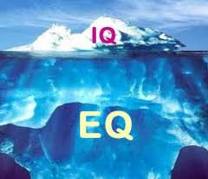In the fields I have studied, emotional intelligence is more powerful than IQ in determining who emerges as a leader. IQ is a threshold competence. You need it but it doesn’t make you a star. Emotional intelligence can.
–Warren Bennis
What is Emotional Intelligence?
Dr. Ruven Bar-On is an early pioneer in emotional intelligence and the developer of the Emotional Quotient Inventory (EQ-i). He prefers to think of emotional intelligence as emotional social intelligence (ESI) and defines it as: “an array of non cognitive capabilities, competencies and skills that influence one’s ability to succeed in coping with environmental demands and pressures”.

Non cognitive means different from (and in addition to) the conventional intellectual quotient (IQ) that most of us understand. Some people, like Dr. Steven Stein, like to refer to this kind of intelligence as common sense. Some researches like to think of it as social intelligence and others prefer the term people skills.
Regardless of what you call it, emotional intelligence has been proven to be a key factor in individual leader and group success. As a matter of fact, research has shown that EI can count for nearly twice as much as IQ when predicting success.
Why be concerned with EI?
Social neuroscience has proven that we react to situations emotionally first and intellectually second. Social neuroscience is defined as the understanding how biological systems (especially the human brain) implement social processes and behavior. Understanding EI and your particular levels of it lead to the ability to control your emotions, and to improve intrapersonal and interpersonal skills, which are all keys to leadership growth.
How is EI measured and what does it yield?
There are a variety of EI assessment tools that are available to use in the coaching environment. However, the one most accepted by businesses today is the Bar-On EQ-i. This tool, in its best business configuration, is a simple self reporting assessment with 125 questions and takes 20 – 30 minutes to complete. This tool assesses 15 sub factors that roll up into an overall EI score. Like the standard IQ test (Stanford-Binet) the mean or average score based on a large normalized sample in North America is 100.
Using this normalized scale, it is possible to compare the national norm to an individual’s (or group’s) total EI as well as the 15 sub factor scores such as: self-regard, assertiveness, self-awareness, independence, self-actualization, empathy, interpersonal relationships, reality testing, flexibility, problem solving, stress tolerance, impulse control. When placed in a graphic representation, it becomes easy to see opportunities for improvement which help in developing a personal development plan.
Another version of this tool is also available as a 360 degree assessment completed by the client’s co-workers, employees, and/or managers.
Used another way, this assessment tool can be used to assess organizational culture when administered to a group of company selected star performers. Using the star performer scores as a benchmark, it is then possible to compare individual scores to the scores of star performers and, therefore, customizes the process to fit the organization.
What about the business case for EI?
Dr. Cary Cherniss of Rutgers University has written extensively about emotional intelligence including a 19 point business case. Click on the following link to see what he has said … true then and true now: Emotional Intelligence Business Case.
Look at a man the way that he is, he only becomes worse. But look at him as if he were what he could be, and then he becomes what he should be.
–Goethe
